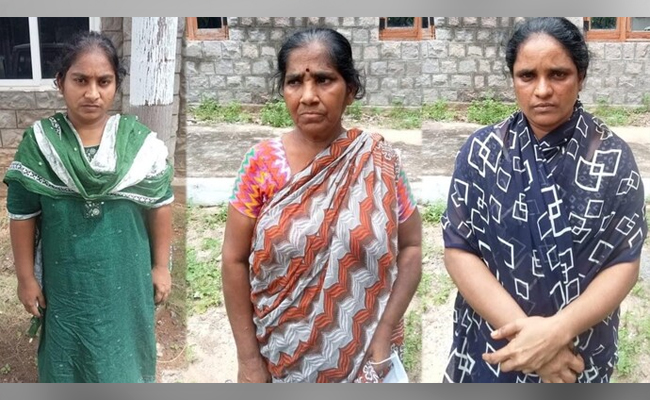Vijayawada: In a shocking revelation, three women from Tenali, Guntur district, have been arrested for their involvement in a series of cyanide murders targeting vulnerable individuals over the past two years. The accused, identified as Munagappa Rajani (40), Mudiyala Venkateswari alias Bujji (32), and Gontu Ramanamma (60), have confessed to killing three people and attempting to kill three others for gold and money.
The police began investigating after discovering the decomposed body of Shaik Nagoor Bee in a field near Vadlamudi village two months ago. The initial case of suspicious death took a darker turn after mobile data analysis and witness testimonies, including that of an auto driver named Mahesh, led to the unearthing of a chilling conspiracy.
The accused women lured their victims with friendly gestures, offering them cyanide-laced drinks and food. Among the victims were Venkateswari's mother-in-law, Subbalakshmi, who was killed for her property and gold, and Nagamma, a 65-year-old neighbor murdered last August to evade a loan repayment. In another case, the trio collaborated with the wife of a man to kill him for insurance and pension benefits.
Police have identified three other women as targets of attempted murders, but they survived due to various circumstances. The accused purchased the cyanide from a gold shop employee named Krishna, who is currently on the run. Investigations are ongoing to determine if there are more victims linked to the group's gruesome activities.
Let the Truth be known. If you read VB and like VB, please be a VB Supporter and Help us deliver the Truth to one and all.
New Delhi (PTI): Broken relationships, while emotionally distressing, do not automatically amount to abetment of suicide in the absence of intention leading to the criminal offence, the Supreme Court on Friday said.
The observations came from a bench of Justices Pankaj Mithal and Ujjal Bhuyan in a judgement, which overturned the conviction of one Kamaruddin Dastagir Sanadi by the Karnataka High Court for the offences of cheating and abetment of suicide under the IPC.
"This is a case of a broken relationship, not criminal conduct," the judgment said.
Sanadi was initially charged under Sections 417 (cheating), 306 (abetment of suicide), and 376 (rape) of the IPC.
While the trial court acquitted him of all the charges, the Karnataka High Court, on the state's appeal, convicted him of cheating and abetment of suicide, sentencing him to five years imprisonment and imposing Rs 25,000 in fine.
According to the FIR registered at the mother's instance, her 21-year-old daughter was in love with the accused for the past eight years and died by suicide in August, 2007, after he refused to keep his promise to marry.
Writing a 17-page judgement, Justice Mithal analysed the two dying declarations of the woman and noted that neither was there any allegation of a physical relationship between the couple nor there was any intentional act leading to the suicide.
The judgement therefore underlined broken relationships were emotionally distressing, but did not automatically amount to criminal offences.
"Even in cases where the victim dies by suicide, which may be as a result of cruelty meted out to her, the courts have always held that discord and differences in domestic life are quite common in society and that the commission of such an offence largely depends upon the mental state of the victim," said the apex court.
The court further said, "Surely, until and unless some guilty intention on the part of the accused is established, it is ordinarily not possible to convict him for an offence under Section 306 IPC.”
The judgement said there was no evidence to suggest that the man instigated or provoked the woman to die by suicide and underscored a mere refusal to marry, even after a long relationship, did not constitute abetment.





